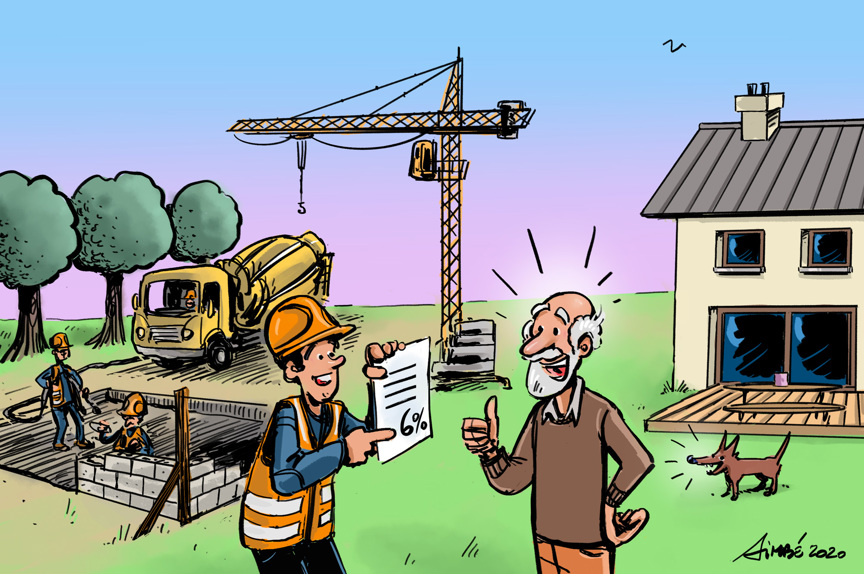- Construction Law , Tax Law
- VAT regime , demolition and reconstruction projects , VAT regime for demolition and reconstruction projects , abolition of the reduced VAT rate , sole and owner-occupied residence , social rental , reduced VAT rate , favourable scheme centre cities , single and own residence
Since 1 January 2024, new legislation has come into force regarding VAT on demolition and reconstruction projects.
This is fully in line with what was previously discussed in our article of 28 November 2023.
With this article, we give you an overview of this new VAT regime, starting from the VAT schemes that were in place until recently, namely :
- The permanent favourable VAT regime in the 32 centre cities ("favourable regime centre cities");
- The temporary favourable VAT scheme for demolition and reconstruction that applied to the entire Belgian territory ("former temporary scheme").

Both regimes will be abolished as from 1 January 2024 (subject to certain transitional measures) and replaced by one single VAT regime applicable to the entire Belgian territory.
The main change in this new VAT regime consists of the abolition of the reduced VAT rate on the sale of houses rebuilt after demolition. This means bad news for property developers.
Other favourable VAT schemes for social housing, as well as for the installation of solar panels, solar boilers and heat pumps, are not covered, or not as comprehensively, in this article.
1. The new VAT scheme for demolition and reconstruction
Existing systems are replaced by one global system
Under the previous system, a permanent favourable VAT regime was initially applicable in the 32 centre cities. This allowed the construction cost for a residential project, where a property was completely demolished and a new residential unit built, to be invoiced at a reduced VAT rate of 6%.
This VAT scheme could be applied by anyone, including property developers, turnkey companies and private investors. The aim was to encourage private investment in residential projects in the 32 centre cities, where the shortage of quality residential units was the greatest.
In 2021, this VAT scheme was temporarily (initially for a period of two years with a possible additional one-year extension) extended to the entire territory of Belgium, albeit under stricter conditions. To benefit from the 6% VAT rate outside the 32 centre cities, the project had to meet certain conditions, which can be divided into three categories: social, material and formal conditions.
Both schemes will be abolished as from 1 January 2024 (subject to certain transitional measures) and replaced by one single VAT scheme that:
- applies to the entire Belgian territory, and
- is subject to the following social, material and formal conditions
1.1 The social conditions
The so-called social conditions as written down in the temporary VAT scheme remain unchanged in the new legislation.
To benefit from the reduced VAT rate of 6% from 1 January 2024, one of the following two conditions must be met:
- The principal-natural person uses the reconstructed residence following a demolition and reconstruction project for at least 5 years as the sole and principal owner-occupied dwelling and establishes his domicile there without exceeding the maximum habitable area of 200 m2 ("sole and owner-occupied residence");
- The principal-natural person rents out the new house for at least 15 years to or through the intermediary of a social rental agency or a social housing company recognised by the competent authority on social housing policy ("social rental").
As such, the newly erected building may be used exclusively or mainly as a sole private residence when occupied. A mainly private use is sufficient, so premises that are partly used professionally will also be covered.
The five-year period runs from the first occupation until 31December of the fifth subsequent year.
Also, demolition of the property must be followed by reconstruction. Demolition and reconstruction should thus constitute one act.
1.2. The material conditions
The new final regulation applies only to real estate projects, where the reconstruction of a property is closely linked to the demolition of the original building.
This means that:
- there must be a link between the party demolishing the existing building and the party, which subsequently reconstructs a new property;
- the demolition and reconstruction must take place shortly after each other; if there is too much time between demolition and reconstruction, the scheme will not apply.
1.3. Formal conditions
The supplier's invoice and the duplicate he keeps must mention the elements justifying the application of the reduced VAT rate and include the following statement:
"VAT rate: In the absence of a written dispute within a period of one month from the receipt of the invoice, the customer is deemed to acknowledge that
(1) the works are performed on a residence, the first occupation of which took place in a calendar year less than 10 years prior to the date of the first invoice relating to those works,
(2) the residence, after the performance of those works, is used exclusively or mainly as a private residence, and
(3) the works are provided and invoiced to a final consumer. Where at least one of those conditions is not met, the normal VAT rate of 21 % will apply and the customer will be liable to pay the tax, interest and fines."
Unless there is collusion between the parties, the supplier is released from liability in respect of the conditions to be met for the reduced VAT rate to apply if the principal does not dispute the invoice in writing.
Also, before the time the tax becomes due, the principal must send a declaration to the electronic address designated by the Minister of Finance or his authorised representative. This declaration must state that the building he is having demolished and reconstructed is intended either to be occupied for a period of at least five years, or to be rented out for a period of 15 years to or through a social housing agency or a social housing company recognised by the competent authority on social housing policy. This declaration must be accompanied by a copy of urban planning permission and building contract(s).
Suppliers under these projects are subject to the same obligation but they must additionally provide a copy of the private agreement or notarial deed relating to the property that is to be demolished.
2. What impact will this have in practice
Before 1 January 2024, the reduced rate of 6% also applied to the sale of houses after demolition and reconstruction, provided the sale took place under the regime "single and own residence" or the "social rental". This also allowed property developers, turnkey companies or private investors to benefit from the "former temporary regime".
As stated above, the main change in the new VAT regime consists of the abolition of the reduced VAT rate on the sale of houses rebuilt after demolition. Thus, this means bad news for property developers, turnkey companies or private investors.
It is to be expected that the limitation of the material scope of the new scheme will have a major impact on the housing market in Flanders. It will become even more difficult for professional actors to realise profitable projects, and not only in the 32 central cities.
Despite initial fierce criticism during the legislative process, the legislator has stood firm even for demolition and reconstruction projects in the 32 centre cities. If these projects do not fall under the aforementioned social, material and formal conditions, they will no longer benefit from the reduced VAT rate of 6%.
The abolition of this favourable regime will also have a major impact on the profitability of urban housing projects and, in this way, may also cause problems in implementing the intended housing policy in the 32 central cities concerned. The abolition of the favourable regime will slow down private investment in housing projects, which will have an immediate impact on the urban development of the centre cities in the coming years.
For this reason, it can be expected that various interest groups will want to subject the regulations to judicial review. It goes without saying that the outcome of these proceedings may have an impact on the concrete elaboration of the new regulations.
3. The previous regime is extended through the transitional regime
As indicated above, the new regime will enter into force on 1 January 2024. This raises the question of how this new regime will affect the projects still under construction.
As such, the legislator provides for a transitional regime for, on the one hand, projects that could benefit from the reduced VAT rate under the temporary regime ("single and own residence" and "social rental") and, on the other hand, projects that could benefit from the old favourable regime in the 32 central cities.
3.1. Transitional measure for the former temporary scheme
This transitional measure concerns the specific situation where a property developer, turnkey company or private investor (outside one of the 32 centre cities) realises a project of demolition and reconstruction, which is subsequently sold either to a natural person within the regime "single and own residence" or to a natural or legal person within the regime "social rental".
Under the "former temporary regime", these projects could benefit from the reduced VAT rate of 6%.
Current projects, which in principle can no longer enjoy the reduced VAT rate based on the new rules, can still claim this reduced VAT rate under the transitional regime provided that:
- before 1 July 2023, the application for the building permit was submitted and officially received;
- no later than 31 December 2024, the VAT became due.
Note that an approval of the application is thus not necessary to fall under the transitional measure. The mere application for the building permit within the stipulated time frame is sufficient.
3.2. Transitional measure for the regime "favourable scheme centre cities"
For projects in one of the 32 centre cities that do not meet the social, material and formal conditions, a transitional measure is also provided for provided that:
- the application for the building permit is submitted and officially received before 1 January 2024;
- the favourable VAT rate only applies to VAT that becomes due on 31 December 2024 at the latest.
4. Conclusion
The legislator opted to abolish the existing VAT regimes as of 1 January 2024 (subject to certain transitional measures) and replace them with a single VAT regime that:
- applies to the entire Belgian territory, and
- is subject to certain social, material and formal conditions
Only projects with private builders will still be able to fall under the "single and own residence" regime, while the "social renting" regime will remain virtually the same.
For projects, which were already running on 1 January 2024, a transitional regime can be applied until the end of 2024, provided the conditions are met.
The changes will undoubtedly have an impact on the housing (construction) market. Some further legal action by interest groups against the new legislation cannot be ruled out.
Would you like more information or assistance from the Seeds of Law specialists? Please do not hesitate and contact our specialists: +32 (0)2 747 40 07 or info@seeds.law.





